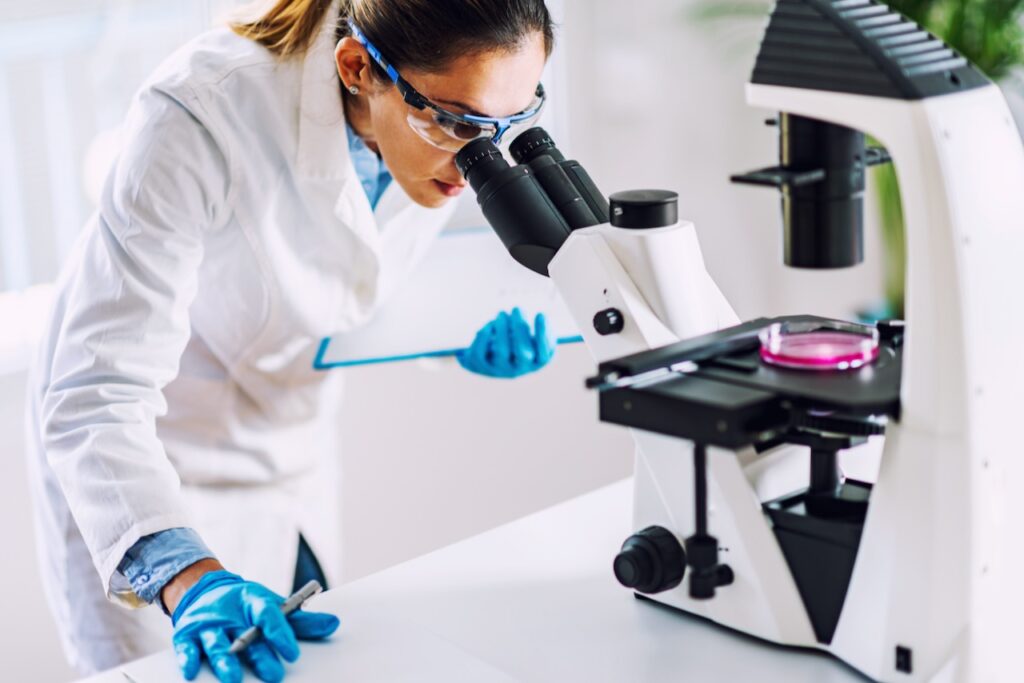
It is well known that genes shape our appearance, character and personal abilities. In addition, environmental influences play a major role in development. There are various factors that activate or deactivate certain genes. The related field is epigenetics. The term is composed of "genetics" and "epigenesis". Epigenesis is the formation of new structures.
Special situations, life circumstances, food or toxins affect your genes in such a way that an immediate change occurs. It is not only the genes themselves that actively steer your life in certain directions, but also external influences control their function.
To many people, epigenetics seems a bit creepy. They immediately think of a chameleon that changes color at will, or even worse, a werewolf or other shape-shifter. But none of that has anything to do with epigenetics.
Epigenetics studies the influence of external factors on gene activity. The mechanisms underlying epigenetics decide whether certain genes are switched on or off. The genetically anchored information in the genome remains unaffected.
Epigenetics does not trigger mutations, but rather a modification or gene regulation takes place. Rather, chemical molecules dock onto the DNA structure. The epigenetic mechanisms function in a similar way to keys that open and close a lock depending on the situation.

Epigenetic changes take place through DNA methylation. This involves the addition of methyl groups to the information-bearing DNA building blocks. As a result, the gene is deactivated. Various enzymes are able to remove the methyl group and reverse this process. The gene is then activated again.
The second mechanism is based on histone modification. The histones perform the function of a kind of cable drum, packing the DNA so tightly that it fits into the nucleus of the cell. In this case, the acetyl and methyl groups stick to the histones. This so-called histone methylation or histone acetylation changes the distance between the individual histones and thus influences the reading of the genetic information.
The best example is identical twins who develop differently. They have the same genome, but the epigenomes often differ significantly. This is due to different experiences and influences. In short, what you are owes not only to your genes, but also to your environment, the way you grow up, what you deal with and how you are nurtured.
The living conditions and Habits make a person what he or she is. That is why often not all two twins get diabetes, even if the predisposition is generally present in both siblings. As Spanish scientists found out, identical twins are still very similar as children. With age, the epigenetic code gapes further and further apart, and significant differences emerge. Often twins develop in completely different directions, depending on which of the existing Potential reaches maturity.
Green tea is known to reduce the risk of cancer. This is due to the substance epigallocatechin-3-gallate (EGCG), which is released when the unfermented tea is brewed. This reactivates a gene that provides the blueprint of a cancer-fighting substance. In many seniors in particular, this gene is silenced, which promotes the formation of tumors in this group of people.
Another prominent epigenetic example is the queen bee. It is the royal jelly, or queen bee food, that turns a common bee larva into a queen. Larvae fed on simple honey pollen mash develop into infertile worker bees, even though they have the same genetics and thus the Potential to the queen. A fatty acid contained in royal jelly activates a previously silenced gene.
Towards the end of World War II, many pregnant women in the Netherlands suffered from malnutrition, as a result of which their children were born underweight. Later, changes were found in their epigenome that led to obesity and diabetes. The breakdown of sugar was disturbed because their bodies were not programmed for adequate nutrition. However, epigenetic imprinting in the womb cannot be equated with cross-generational inheritance.
Do you remember the experiences of your great-grandparents? You certainly don't, but maybe your genes do. The fact is that science has not yet been able to clarify the question of epigenetic inheritance across generations. But there are indications that epigenetic inheritance seems quite plausible.
For example, certain talents and preferences are inherited over generations. Whether this is based on the experience of the ancestors or on genetic predisposition remains to be seen. In order to develop special skills, the general conditions must be right. Not every individual develops the same talent under the same conditions.
Traits based on epigenetic inheritance could include special herding abilities. For example, Western horses bred over the centuries to work cattle have what is known as cow sense. The horses are instinctively able to match their movements with those of the cattle. Working cattle is in their blood, as it is for many herding dogs. Although this behavior is probably not based on an epigenetic mechanism that switches certain genes on and off, it can nevertheless be assumed that it is inherited on the basis of experience.
As already mentioned, there are special foods that prevent the development of cancer by acting on the genes. In addition, with the right knowledge, heart disease and diabetes can be prevented, as well as Alzheimer's disease.
Currently, epigenetics is still the subject of intensive scientific research. The aim is to find out which lifestyles and foods switch which genes on and off and when. Researchers are also investigating whether the knowledge acquired about epigenetics can be used therapeutically.
The fact is that some people have a genetic predisposition to develop one disease or another under certain conditions, while others do not.
As studies show, bad experiences change the epigenome. Infants who have little Security often suffer from a disturbed stress hormone system even in their later years. Experiments with mice suggest that the epigenetic changes are even passed on to the offspring. Among other things, this manifests itself in risk-taking behavior.
That epigenetics can influence behavior has been proven. It is also very likely that it is heritable. In animal experiments, the offspring of traumatized mice showed the same Behavioral problems as their mothers, although they themselves never experienced such a stressful situation. In addition, metabolic changes were detectable.
It is interesting to note that positive experiences contribute to the Trauma and to erase the traces in the genetic material. After a significant improvement in their living conditions, the mice discarded the abnormal behavior and in turn passed on their acquired positive basic mood to their offspring. This finding makes epigenetics interesting for psychology.
Epigenetics may soon play a greater role in coaching in the psychotherapeutic field. Epigenetics is thought to influence addictive behavior and stress management. A link to the development of depression is also possible. The epigenetic effects are particularly fatal in babies who received too little care. Methylation of the stress system increases the risk of anxiety disorders, depression and other mental illnesses.
The reason why scientists are so eager to study epigenetic processes is primarily in the medical field. The primary aim is to gain a better understanding of diseases that were previously unexplained by genetic factors. It is hoped that this will provide new insights into the treatment of diabetes, schizophrenia and Alzheimer's disease.
As already mentioned, epigenetics provides psychology with valuable approaches. In addition, there are experts who work in the field of personality development and transformation and use the innovative approaches from modern epigenetics research for this purpose. Such an epigenetics coach is, for example, skilled in meditation, bodywork, emotion regulation and mental training active.
Epigenetics Coaching aims at maintaining health and releasing blockages. It leads to more self-satisfaction and emotional Resilience. You learn to regulate yourself better. Discovering your own strengths and the ability to lead a self-determined and autonomous lifestyle is also the goal of Epigenetics Coaching. In short, the coach encourages you to fully exploit your genetic potential.
Epigenetics coaching is about prevention. The coach knows that the cause of many diseases can be found in gene activity. He works on a deep level and favors sustainable changes that permanently preserve the quality of life. By understanding the reciprocal effect, you will receive valuable support in overcoming problems in different areas of your life.

